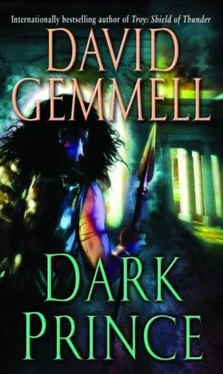'How. . did you come by it?'
'As I fell, I reached out. My fingers hooked into it.'
In that moment Parmenion realized just why the King's paranoia had disappeared. The magic of the necklet prevented any evil from entering the heart or mind of the wearer.
But what had its loss meant to Alexander?
'I will ride at once, sire,' he said.
'Do you know where he has gone?'
'No, but I know where to look.'
'I will come with you,' said Attalus.
'I do not think that would be wise,' the Spartan told him.
'Wise or not, I will apologize to his face.'
'He may kill you — and I would not blame him.'
'Then I will die,' said Attalus. 'Come, let us go.'
The River Axios, Winter 337 BC
Sleet had begun to fall, icy needles that penetrated the thickest cloak, and the waters of the nearby river — swollen by incessant rain over the last few weeks — surged angrily against the bank. Hephaistion built a fire against a fallen log and the Companions gathered around it, huddled into their cloaks.
'Where shall we go?' asked Ptolemy, holding out his slender hands to the flickering flames. Alexander did not reply.
He seemed lost in thought.
'West to Epirus,' said Craterus. 'We all have friends there.'
'Why not north-west into Pelagonia?' put in Cassander. 'The army there are the men we rewarded after the Triballian campaign. They would rise in Alexander's name.'
Hephaistion looked to the prince, but still Alexander gave no indication that he was listening. Hephaistion added fuel to the fire and leaned his back against a rock, closing his mind to the cold.
It had been a night like this when first he had met Parmenion ten years ago, with sleet turning to snow on the high ground. Only then there had been the sound of the hunting dogs howling in the night, the stamping of hooves as the hunters searched for the runaway boy. Hephaistion had been thirteen years old, living with his widowed mother on a small farm in the Kerkine Mountains. Early one morning Paionian tribesmen from the north had raided into Macedonia, sweeping down from the high passes, killing farmers and sacking two towns. Outriding scouts had come to their farm. They had tried to rape his mother, but she fought so hard that they had killed her, stabbing her through the heart. The young Hephaistion slew the killer with a hand-axe and then ran for his life into the woods. The scouts had war-dogs with them and these had raced after him. Despite the cold the boy had waded through swollen streams, throwing them off the scent for a while. But as midnight approached the dogs had closed in.
Hephaistion shivered as he recalled what had happened. He had picked up a sharp rock and was crouched waiting.
The dogs, two huge beasts with slavering jaws, had bounded into the clearing, closely followed by the six scouts on their painted ponies.
On a shouted command from the leader — a slim, wiry man wearing a yellow cloak — the dogs halted before the boy.
Hephaistion had backed away to a boulder, the rock in his hand.
'See the dogs, child,' said the leader, his voice guttural and cruel. 'In a few moments I will order them to rip you to pieces. See how they stand, as if leashed? They are well trained.' Hephaistion could not keep his eyes from the hounds. Their lips were drawn back over heavy muzzles, showing long, sharp, rending fangs. In his terror the boy's bladder had given way and the six riders had laughed aloud at his shame.
A tall man in bright armour stepped from behind the rocks, a short, stabbing sword in his hand. The dogs howled and charged but the warrior moved swiftly in front of the boy, his sword sweeping out and down, half decapitating the first hound and skewering the heart of the second.
The action had been so swift that the men had not moved. But the leader, seeing his war-dogs slain, dragged clear his sword and kicked his horse forward. Arrows sliced through the night air. The first shaft took the leader behind the ear, punching through to his brain. He toppled sideways from his mount. The other Paionians tried to escape, but the arrows came from all sides. Within a few heartbeats all six men and four of the horses were dead or dying.
Hephaistion dropped the rock and turned to the tall warrior, who was wiping blood from his blade.
'Thank you, sir,' he managed to say. The man sheathed his sword and knelt before him, his eyes seemingly grey in the moonlight.
'You did well, boy,' he said, reaching out to grip Hephaistion's shoulders. 'You stood your ground like a warrior.'
The boy shook his head, tears beginning to flow. 'I wet myself in fear.'
'And yet you neither ran, nor begged for your life. Do not be ashamed of a momentary weakness of the bladder.
Come, let us go somewhere warm and find you some dry clothing.'
'Who are you, sir?'
'I am Parmenion,' answered the man, rising to his feet.
'The Lion of Macedon!'
'The very same.'
'You saved my life. I shall not forget it.'
The general had smiled and moved away into the centre of the clearing, where Macedonian archers were stripping the corpses. A young officer led Parmenion's horse forward and the general smoothly vaulted to its back. Then he held out a hand to Hephaistion. 'Come, ride with me!'
Hephaistion smiled at the memory.
'He is coming,' said Alexander suddenly.
'Who?' asked Ptolemy.
'Parmenion. Attalus is with him.'
The youngster stood, staring south through the sleet. 'I see no one, Alexander.'
'They will be here within the hour,' said Alexander, almost dreamily.
'How do you know?' asked Craterus.
'A vision from the gods,' the prince answered.
'If it is a true vision, how could Parmenion know where to find us?'
'How indeed?' responded Alexander, his sea-green eyes gleaming as they focused on Hephaistion.
'I left a message for him, telling him we had headed north,' said the officer.
'What?' roared Craterus. 'You are a traitor then!'
'Be quiet, my friend,' said Alexander, his voice soft and almost gentle. 'Let Hephaistion speak.'
'The general asked me to watch over the prince, to see that no harm befell him. I have done that. But Parmenion is Alexander's only true friend among the elders. I felt it vital that he should know where to look for us.'
'And yet he brings Attalus with him,' put in Ptolemy. 'How do you read that situation?'
Hephaistion slowly placed two thick branches on the guttering fire. 'I trust Parmenion,' he said at last.
'As do I,' said Alexander, moving across the fire to sit beside the officer. 'But can I trust you, soldier?'
'Yes,' Hephaistion told him, meeting his gaze.
Alexander smiled. 'Do you have dreams, Hephaistion? Ambitions?'
'Of course, sir.'
'My dreams will take us all across the world. Will you follow me to glory?' His voice was soothing, almost seductive, and Hephaistion felt himself drifting, visions filling his head of great armies marching, tall cities burning, rivers of gold flowing before his eyes, rivers of blood swirling around his feet. 'Will you follow me?' asked Alexander again.
'Yes, sire. To the ends of the earth.'
'And maybe beyond?' the prince whispered.
'Wherever you command.'
'Good,' said Alexander, clapping the young man on the shoulder. 'Now let us wait for our visitors.'
* * *
The sleet turned to snow, icy flakes that stung as they touched exposed skin. Craterus, Ptolemy and Cassander began to strip branches from surrounding trees, trying in vain to build a small shelter but being constantly thwarted by the gusting winds.
Alexander sat silently by the tiny fire, snow settling on his cloak and hair as his eyes gazed into the flickering flames.
Hephaistion shivered, drawing his own woollen cloak more tightly about him. The prince's mood worried him: Alexander seemed in an eldritch state, uncaring of danger, seemingly comfortable even within this sudden blizzard.
Читать дальше












